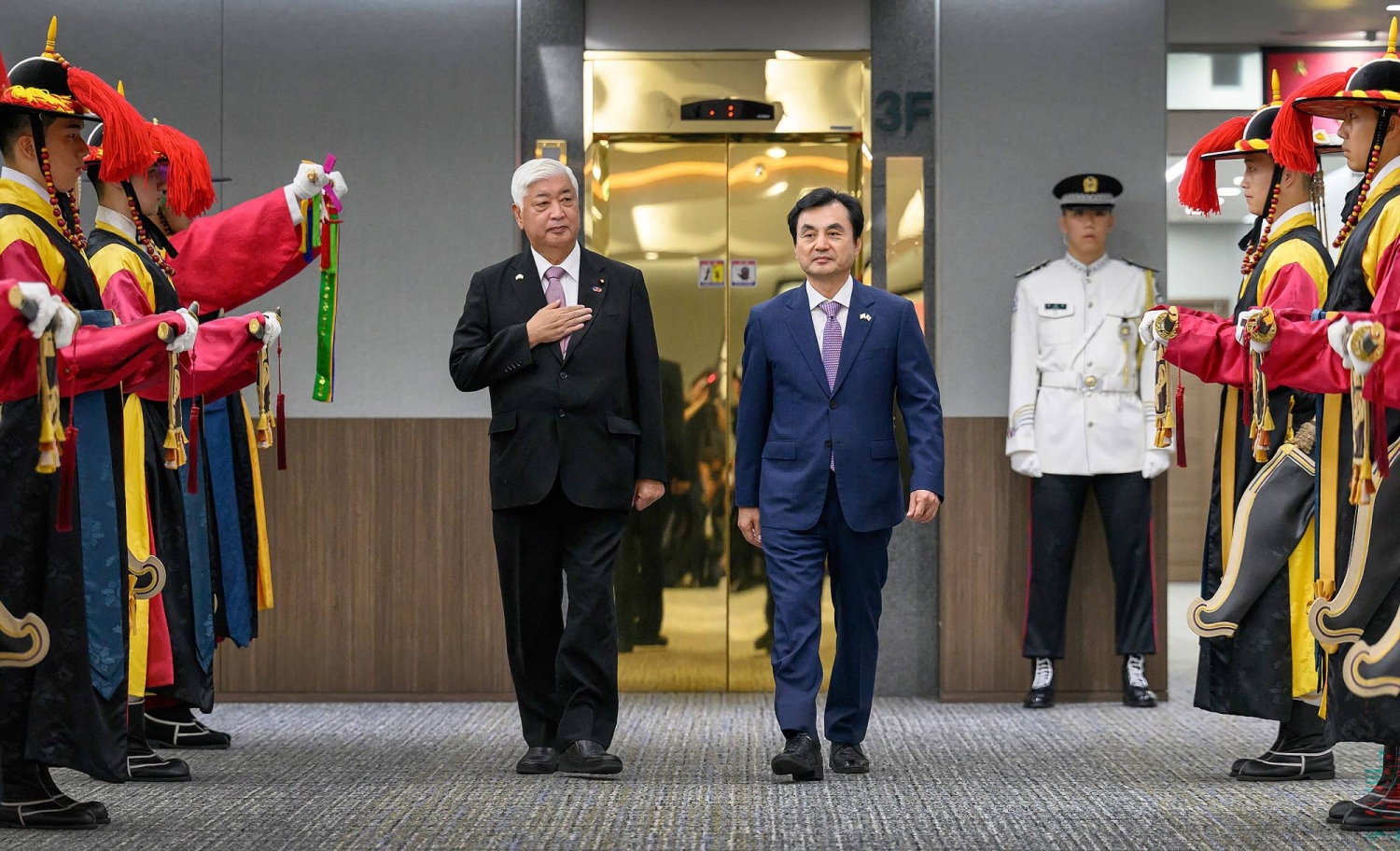Japan and South Korea Defense Chiefs Agree to Regular Visits, Tech Cooperation

Image Credits: The Japan Times
In a landmark development marking the first visit to South Korea by a Japanese defense minister, gen Nakatani met with his South Korean counterpart Ahn Gyu-back in Seoul on Monday. The two sides reached an accord to institutionalize mutual visits and foster sustained high-level engagement, while also mapping out avenues for collaborations in advanced defense technologies.
In their joint communique, the ministers pledged to deepen communication and expand personnel exchanges, including regular defense ministerial dialogues. As an illustration of these efforts, they welcomed the participation of the South Korean military band in the upcoming self-defense forces music festival slated for November, underscoring a spirit of renewed goodwill.
Though modest in appearance, the step signifies a watershed moment in bilateral defense relations, which had soured after a 2018 incident in which a South Korean warship allegedly locked its fire-control radar on a Japanese patrol aircraft. Seoul denied the accusation, but the episode severely eroded mutual trust. Relations began to thaw only last year, when both nations’ defense chiefs committed to restoring security cooperation and adopting safeguards to prevent a recurrence. This rapprochement paved the way for then-South Korean Defense Minister Shin Won-sik’s visit to Japan in July 2024, the first by a South Korean defense chief in 15 years.
Looking ahead, Tokyo and Seoul signed their determination to pursue future-orientation cooperation in cutting-edge domains such as artificial intelligence, unmanned defense systems, and outer space technologies. Looking ahead, Tokyo and Seoul signaled their determination to pursue future-oriented cooperation in cutting-edge domains such as artificial intelligence, unmanned defense systems, and outer space technologies. Both sides view this as a mutually beneficial strategy to strengthen their next-generation capabilities amid a rapidly evolving security environment.
Nakatani’s visit comes against the backdrop of intensifying concerns over North Korea’s burgeoning military partnership with Russia and China, highlighted by Kim Jong Un’s high-profile attendance at a military parade in Beijing alongside Xi Jinping and Vladimir Putin. In response, the ministers reaffirmed their unwavering commitment to the complete denuclearization of the Korean Peninsula and stressed the importance of joint vigilance against the deepening Moscow–Pyongyang axis.
The two leaders also pledged to further consolidate bilateral defense ties while reinforcing trilateral cooperation with the United States, recognizing the imperative of unity amid rising geopolitical volatility. Nakatani is scheduled to participate in the Seoul Defense Dialogue on Tuesday, a flagship security forum convened annually by South Korea’s Defense Ministry. His trip, originally planned for December, was postponed following former President Yoon Suk Yeol’s controversial martial law bid.
The timing of the visit coincides with political turbulence in Tokyo, as Prime Minister Shigeru Ishiba has announced his intention to resign in the coming weeks, a decision that could reshape Japan’s diplomatic trajectory, particularly its rapprochement with Seoul. Ishiba had met South Korean President Lee Jae Myung late last month, where both leaders reaffirmed a shared desire to move beyond historical grievances and focus on economic and security collaboration, particularly in navigating complex relations with the administration of U.S. President Donald Trump.
Underscoring the importance Seoul attaches to ties with Tokyo, President Lee chose Japan as the destination for his first overseas visit, the first time a South Korean leader has done so since the normalization of diplomatic relations in 1965. This symbolic gesture was followed by the issuance of the first joint statement in 17 years, in which both nations vowed to act as strategic partners in addressing the pressing challenges of the global order.
Nevertheless, Ishiba’s departure injects an element of uncertainty into this diplomatic thaw, especially if succeeded by a more conservative leader less amenable to compromise on historical disputes. Lee’s election in June had initially alarmed Tokyo due to his reputation for hard-line stances on Japan, raising fears of potential reversals of agreements forged under Yoon that had catalyzed rapprochement and revived trilateral security cooperation with Washington.
Despite these concerns, a senior official from South Korea’s Presidential Office told Yonhap News Agency that both governments had achieved a broad consensus on building stable, future-oriented relations. The official emphasized Seoul’s expectation that the positive momentum in bilateral ties will continue, irrespective of Ishiba’s resignation.
Top Stories
- A Simple Guide to Understanding Benefits of Rigid Boxes
- A Packaging Guide for Artisanal and Handmade Product Brand
- UFLEX Expands PET Recyclable Woven Polypropylene Food Packaging to Mexico
- Tetra Pak Launches India’s First Carton Packaging with Certified Recycled Polymers
- PepsiCo Reinforces pep+ Strategy with Sustainable Packaging Goals
